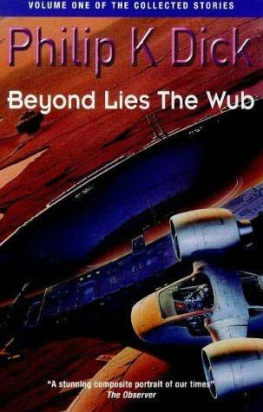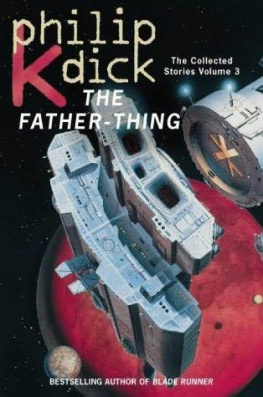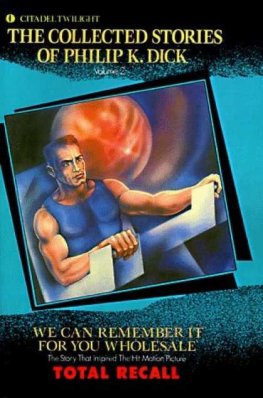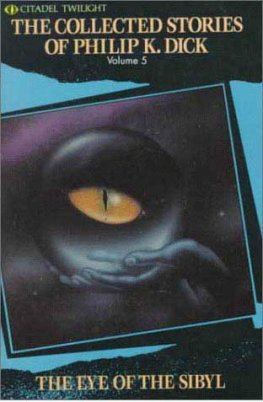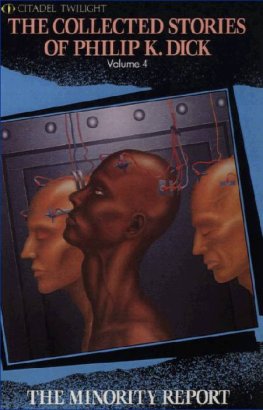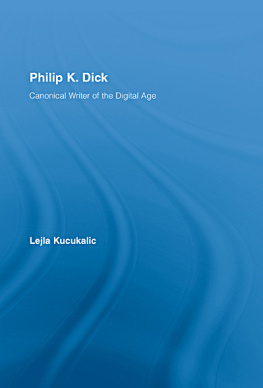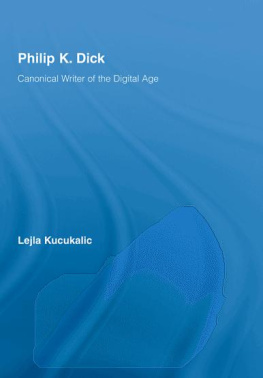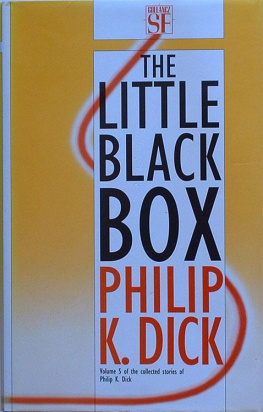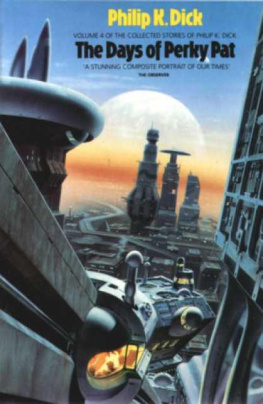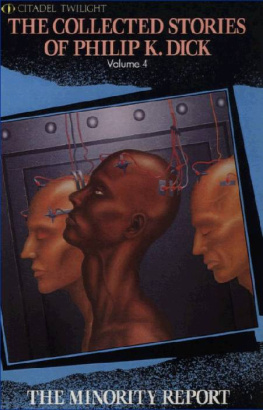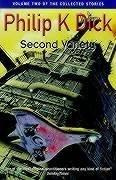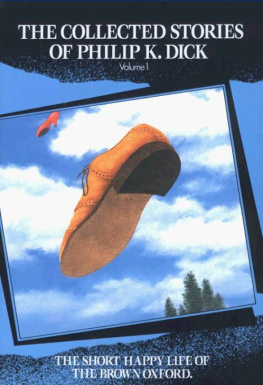Philip K Dick - Beyond Lies the Wub (Collected Stories: Vol 1)
Here you can read online Philip K Dick - Beyond Lies the Wub (Collected Stories: Vol 1) full text of the book (entire story) in english for free. Download pdf and epub, get meaning, cover and reviews about this ebook. year: 1987, publisher: Millennium Paperbacks, genre: Detective and thriller. Description of the work, (preface) as well as reviews are available. Best literature library LitArk.com created for fans of good reading and offers a wide selection of genres:
Romance novel
Science fiction
Adventure
Detective
Science
History
Home and family
Prose
Art
Politics
Computer
Non-fiction
Religion
Business
Children
Humor
Choose a favorite category and find really read worthwhile books. Enjoy immersion in the world of imagination, feel the emotions of the characters or learn something new for yourself, make an fascinating discovery.
- Book:Beyond Lies the Wub (Collected Stories: Vol 1)
- Author:
- Publisher:Millennium Paperbacks
- Genre:
- Year:1987
- Rating:4 / 5
- Favourites:Add to favourites
- Your mark:
- 80
- 1
- 2
- 3
- 4
- 5
Beyond Lies the Wub (Collected Stories: Vol 1): summary, description and annotation
We offer to read an annotation, description, summary or preface (depends on what the author of the book "Beyond Lies the Wub (Collected Stories: Vol 1)" wrote himself). If you haven't found the necessary information about the book — write in the comments, we will try to find it.
Beyond Lies the Wub (Collected Stories: Vol 1) — read online for free the complete book (whole text) full work
Below is the text of the book, divided by pages. System saving the place of the last page read, allows you to conveniently read the book "Beyond Lies the Wub (Collected Stories: Vol 1)" online for free, without having to search again every time where you left off. Put a bookmark, and you can go to the page where you finished reading at any time.
Font size:
Interval:
Bookmark:
The Collected Stories of Philip K. Dick Vol. 1
by Philip K Dick
IN MEMORY OF PHILIP K. DICK
1928-1982
By Philip K. Dick
I will define sciencefiction, first, by saying what sf is not. It cannot be definedas "a story (or novel or play) set in the future," sincethere exists such a thing as space adventure, which is set in thefuture but is not sf: it is just that: adventures, fights and wars inthe future in space involving super-advanced technology. Why, then,is it not science fiction? It would seem to be, and Doris Lessing(e.g.) supposes that it is. However, space adventure lacks thedistinct new idea that is the essential ingredient. Also, therecan be science fiction set in the present: the alternate world storyor novel. So if we separate sf from the future and also fromultra-advanced technology, what then do we have that can becalled sf?
We have a fictitiousworld; that is the first step: it is a society that does not in factexist, but is predicated on our known society; that is, our knownsociety acts as a jumping-off point for it; the society advances outof our own in some way, perhaps orthogonally, as with the alternateworld story or novel. It is our world dislocated by some kind ofmental effort on the part of the author, our world transformed intothat which it is not or not yet. This world must differ from thegiven in at least one way, and this one way must be sufficient togive rise to events that could not occur in our society -- or in anyknown society present or past. There must be a coherent idea involvedin this dislocation; that is, the dislocation must be a conceptualone, not merely a trivial or bizarre one -- this is theessence of science fiction, the conceptual dislocation within thesociety so that as a result a new society is generated in theauthor's mind, transferred to paper, and from paper it occurs as aconvulsive shock in the reader's mind, the shock ofdysrecognition. He knows that it is not his actual world that heis reading about.
Now, to separatescience fiction from fantasy. This is impossible to do, and amoment's thought will show why. Take psionics; take mutants such aswe find in Ted Sturgeon's wonderful MORE THAN HUMAN. If thereader believes that such mutants could exist, then he will viewSturgeon's novel as science fiction. If, however, he believes thatsuch mutants are, like wizards and dragons, not possible, nor willever be possible, then he is reading a fantasy novel. Fantasyinvolves that which general opinion regards as impossible; sciencefiction involves that which general opinion regards as possible underthe right circumstances. This is in essence a judgment-call, sincewhat is possible and what is not possible is not objectively knownbut is, rather, a subjective belief on the part of the author and ofthe reader.
Now to define goodscience fiction. The conceptual dislocation -- the new idea, inother words -- must be truly new (or a new variation on an old one)and it must be intellectually stimulating to the reader; it mustinvade his mind and wake it up to the possibility of something he hadnot up to then thought of. Thus "good science fiction" is avalue term, not an objective thing, and yet, I think, there really issuch a thing, objectively, as good science fiction.
I think Dr. WillisMcNelly at the California State University at Fullerton put it bestwhen he said that the true protagonist of an sf story or novel is anidea and not a person. If it is good sf the idea is new, it isstimulating, and, probably most important of all, it sets off achain-reaction of ramification-ideas in the mind of the reader; itso-to-speak unlocks the reader's mind so that that mind, like theauthor's, begins to create. Thus sf is creative and it inspirescreativity, which mainstream fiction by-and-large does not do. We whoread sf (I am speaking as a reader now, not a writer) read it becausewe love to experience this chain-reaction of ideas being set off inour minds by something we read, something with a new idea in it;hence the very best science fiction ultimately winds up being acollaboration between author and reader, in which both create -- andenjoy doing it: joy is the essential and final ingredient ofscience fiction, the joy of discovery of newness.
(in a letter) May14,1981
By Steven Owen Godersky
There is a currentcoin-of-phrase that touts Philip K. Dick as the greatest sciencefiction mind on any planet. Well, that and a trajectory toLagrange-5 are hyperbolic. The returns simply are not all in. Thebest is a tale that has yet to be written.
There are some things,though, that might make us feel a little more secure about PhilDick's contribution to this planet, not that his reputationneeds any particular help today. The scope, the integrity and theintellectual magnificence of Phil's work are internationally revered.He is regarded by many as the most "serious" of the modernscience fiction authors, and the interest in his works has continuedto mount since his untimely death in 1982. His reputation has beenfurther enhanced by a growing body of scholarly criticism. If we takea measured look at his accomplishments there are three powerfulthemes that permeate almost every novel and story.
The first and mostprominent theme today, can be seen in Phil's watershed work on thequestion of what divides humanity from all the intricacies of itscreations. This is part of the central preoccupation of allconsequential writers. But Phil rephrased the question What doesit mean to be human? to What is it like not to be human? Heposed the problem intellectually, after his fashion, but then he madeus feel his answers. In the best and really highest traditionof Mary Shelley he struck on empathy as the difference; in his ownword, caritas. I do not have to be a futurist to predict thatboth his search and his discovery will become ever more important tous as we rush along the strange road that science calls progress.
Phil's second theme isone of perspective; what I have come to think of as the care andfeeding of scale-model gods. Though the arena of his ideas was sovery large, what he trusted was, he once wrote, "very small."In a literary era of superstars and superheroes Phil reminds us thatour aspirations and abilities are not so different from, and notless important than, those of the great and powerful.
Think of Tung Chien inFaith of Our Fathers, and Ragel Gumm in Time Out of Joint.Their prosaic drudgery proves central to the fate of theirworlds. Recall Herb Ellis in Prominent Author, an ordinary guyrewrites the Old Testament for inch-tall goatherds. Reflect on thesignificance of Herb Sousa's gumballs in Holy Quarrel; on themoral influence of wub-fur, in NotBy Its Cover, and the battlewith the sentient pinball machine in Return Match. Small iswritten large. Large is written small. Shop clerks and storekeepersare just as likely as warlords and messiahs to be at Dick'sontological foci. Old Mrs. Berthelsen, in Captive Market,possesses the ultimate secret of time and space, and uses it tosell vegetables out of a wagon.
When reading Dick youdon't much see mile-long spaceships flaming into the sun. What you dosee is one broken-down robot in a ditch. Or, more frightening, onebutterfly trapped in a time warp. In Phil Dick's stories, we see thateverything, human or otherwise, is connected, everyone is important;what causes pain to one causes pain to all. As John Brunner pointsout, it certainly caused pain to Phil himself.
Phil Dick's third majortheme is his fascination with war and his fear and hatred of it. Onehardly sees critical mention of it, yet it is as integral to his bodyof work as oxygen is to water.
Perhaps Dick, who beganhis writing career in Berkeley, California, absorbed thesensibilities of a town that had a carefully nurtured liberalcommitment. Perhaps Joe McCarthy and the Korean War sensitized abeginning writer's imagination. We know little of his juvenile yearsduring the Second World War. But we can identify, early andconsistently, a mistrust of the military mentality, a fear of whathe had seen of the total war machine on
Next pageFont size:
Interval:
Bookmark:
Similar books «Beyond Lies the Wub (Collected Stories: Vol 1)»
Look at similar books to Beyond Lies the Wub (Collected Stories: Vol 1). We have selected literature similar in name and meaning in the hope of providing readers with more options to find new, interesting, not yet read works.
Discussion, reviews of the book Beyond Lies the Wub (Collected Stories: Vol 1) and just readers' own opinions. Leave your comments, write what you think about the work, its meaning or the main characters. Specify what exactly you liked and what you didn't like, and why you think so.

